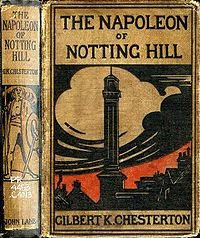 AUTHOR: G.K. Chesterton
AUTHOR: G.K. Chesterton.
TIME: January 2009
.
NOTES:.
.
I was lucky enough to take a class in college about the life and works of G.K. Chesterton. The class fostered in me a love for Chesterton that I presume will last for my whole life. It also romanticised the idea of a stout ale, a good cigar, and chivalry around the ladies. Because of my background in Chestertonianism I was very pleased to spot a paperback version of this, his first novel, the Napolean of Notting Hill. Sidenote: I found it in a great little book shop in southern Ontario. The guy working the shop was a retired teacher/librarian with a pronounced british accent that seemed to know a little something about each and every book in the store. The store itself was located in a gutted old motel and the selection was amazing and fairly priced. Sidenote two: I hope to do a post about good book shops I have found every now and then. But that will have to wait.
-
Those of you who have read some of Chesterton's writing will know that he is a bit of a 'one trick pony'. I would argue that the trick is nuanced in a new and exciting way in most of his books but it is non-the-less the same trick. If I am correct, the backbone of Chesterton's life project was to defend fairyland against the onslaught of objectivism (this would include things like scientific fact, modernism, the enlightenment etc.). Chesterton wants his readers to consider that Truth with a capital 'T' is not always best sook with rationality. In fact much of the most
important truth in life is a profound farce. Consider the son of God being hung from a tree to die; only to return ushering in life. In Notting hill Chesterton leads his reader on a journey to discover this truth.
-
In the TNoNH the reader is confronted with a man who is pronounced King of London seemingly on a whim. This man proceeds to transform london into a ridiculous pagent of color-coded regions each with it's own outlandish dress code. A city code is also drafted that calls for over-the-top pomp and ceremony in everyday governmental affairs. The trick that Chesterton plays on the reader is causing them to judge this new king as a fool only to have them stand whole heartedly behind the values of his farce society in the end. You will have to read the book to see the full mechanics of this shift.
-
I have realized that it seems that I never read a book that I don't like so I have decided to include some critique in my 2009 reviews. In this book it is obvious that you are reading an early Chesterton. He drags on at points and much of the novel feels too surreal. I think he has definantly written better stuff. All that said I think this is good book well worth a read. And its short.
-
